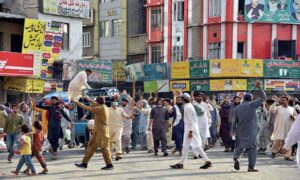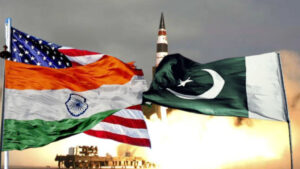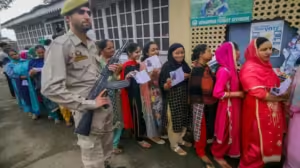Pakistan’s Ominous Shift: Analysing the Rise of Mob Politics and Human Rights Violations

By Hira Riaz
Pakistan’s Political climate stands at a critical juncture, marked by an unsettling rise in mob politics and a deepening concern over human rights violation that demands careful analysis and scrutiny.
In recent years Pakistan has witnessed concerning and ominous shift in the political landscape characterised by an emerging trend of mob politics and human rights violation. While Pakistan asserts its status as a democratic state it is essential to emphasise that a fundamental requirement of any democratic system is the safeguarding of human rights.It is imperative that all the individuals within the state are endowed with fundamental rights including right to life,freedom of expression,freedom of movement etc. While enshrined as a fundamental human right in the Pakistani constitution, freedom of expression faces a stark and troubling reality. Journalists, activists, and bloggers frequently find themselves in the crosshairs for daring to voice dissent.Regrettably, many have suffered detention, torture, or even fatal reprisals as consequences for expressing their views or disseminating information deemed sensitive by the authorities. Disturbingly, in the year 2020 alone, there were a documented 148 instances of violations against journalists and media professionals in Pakistan.In the global landscape, Pakistan emerges as one of the most perilous nations for women, where they grapple with an array of abhorrent acts of violence, spanning rape, honor killings, domestic abuse, and coerced marriages. The Human Rights Commission of Pakistan has reported a staggering 2,297 cases of honor killings transpiring in the country between 2014 and 2016. Extrajudicial killings present a grave and pressing concern within Pakistan, with a particular focus on the province of Balochistan. Allegations abound that security forces are responsible for a disturbing pattern of enforced disappearances and extrajudicial executions, targeting political activists and separatists.Established on the foundation of Islam, Pakistan predominantly housed a Muslim population, although it also accommodated non-Muslim minorities who harboured apprehensions about their future. Quaid-i-Azam, cognisant of these concerns, addressed the matter emphatically in his inaugural speech to the Constituent Assembly on August 11, 1947. He placed special emphasis on the welfare of minorities, declaring, “You are free; you are to go to your temples. You are free to go to your mosques or to any other places of worship in this State of Pakistan. You may belong to any religion or caste or creed that has nothing to do with the business of the State.”
Research shows the significant escalation in human rights violation by mobs from 2021 to 2023.In Pakistan three primary motivations been identified as triggers for mob lynchings. Firstly mob resorts to the killing of victims based on allegations of various crimes, including theft, snatching and kidnapping. Secondly religious motives often drive mobs to target to victims. Thirdly individuals are frequently singled out and subjected to mob violence on charges related to sexual transgressions. On August 14, 2021,Ayesha Akram, a young woman was being assaulted by over 400 men while filming a video in Lahore Park. Report shows that the crowd stole her money, earrings and phone. The incident wherein the crowd hoisted the woman into the air, forcibly disrobed her and subjected her to assault and molestation, ignited a wave of indignation throughout Pakistan. Amnesty International and numerous prominent figures in the country vehemently voiced their outrage and repulsion in response to the appalling act.This incident was the exploitation of ‘freedom of movement’ and ‘women rights’.
On 3rd December, 2021 a Sri Lankan National, Priyantha was lynched by a mob of workers at a factory in Sialkot who accused him of blasphemy. The outbreak of violence stemmed from rumors that Mr. Diyawadanage had supposedly committed a blasphemous act by removing posters bearing the name of Prophet PBUH. However a colleague who swiftly arrived at the scene to rescue him later informed local media that MR. Diyawadanage had, in-fact, taken down the posters in preparation for a cleaning operation within the building. In Sri Lanka the victim’s family consumed by despair, has shared their anger with BBC. Nilushi Dissanayaka, his wife, impassionedly implored the governments of both Pakistan and Sri Lanka to undertake a comprehensive investigation, with the aim of delivering justice to her husband and their two children. This was the extreme reaction as religion in its essence doesn’t necessarily guide people to be radical. Being radical in any field is chaotic.
On 9th August,2023, Imran Khan, Former Prime Minister of Pakistan was arrested. It led to the widespread eruption of violence across the country. The mob chose to incite chaos rather than engaging in peaceful protests. The mob vandalised the police vans, causing injuries to police officers and proceeded to set houses on fire. Report shows that 157 police officers were injured. The peaceful protest is the right of people but rise of such mobs and extremism led to the state at the edge of chaos.
On August 16,2023, the most recent incident of extrajudicial killing unfolded. Two Christian individuals in Jaranwala (subdivision of Faisalabad) were accused of blasphemy. Before any legal hearing or investigation a mob proceeded to spread violence. The mob burnt 19 churches and 89 Christian houses. It further reported that more than 400 residences were impacted in total of which 89 belonged to the Christian community, including those of pastors and priests, and were tragically reduced to ashes, while 15 houses suffered partial destruction. During their fact-finding mission, the HRFP team noted that household items had been plundered, while the remaining possessions were subjected to flames. It was reported that due to timely evacuations, the inhabitants successfully averted harm. The human rights investigators highlighted that a significant portion of those who fled now contend with harrowing circumstances, marked by numerous injuries and instances of reported abuse among women. The report further emphasised that many of these individuals harboured deep apprehensions about the prospect of returning to their homes, expressing an aversion to the idea. These incidents of human rights violation have in return resulted in the exploitation of foreign relations. Mob violence undermines the rule of law and democracy.
In 2020, Freedom House Rated Pakistan human rights at 37 out of 100. Around 0.55 million children are abused annually. A survey found that 25% of women reported experiencing emotional abuse from their husbands and 10% of them haven’t told anyone about the abuse. According to the report of White Ribbon Pakistan ranks at sixth position among the world’s most perilous countries for women. Human rights groups documented a surge in enforced disappearances of Baloch students from educational institutions nationwide. The HRCP, in particular, highlighted a recent upswing in enforced disappearances in both Balochistan and other regions of the country. This distressing trend gained momentum subsequent to a suicide bombing on April 26 at Karachi University, resulting in the tragic loss of three Chinese nationals. Notably, on June 14, security forces released two students from Karachi University, who had been missing since June 7, in response to civil society protests. For decades, Pakistan has grappled with pervasive human rights violations, even as it remains a signatory to numerous international treaties governing human rights. Regrettably, a substantial portion of its population continues to endure daily encroachments upon their fundamental rights. At least 57 cases of blasphemy have been registered from January to May 2023. Report shows that highest number of these cases has been observed from Punjab. In Pakistan, blasphemy convictions, while rarely leading to executions, persist as a common occurrence. Furthermore, despite a majority of these convictions being overturned on appeal in higher courts, the ominous presence of vigilante mobs prevails, who have lynched numerous individuals even before a trial commences. Tragically, the victims of these extrajudicial executions encompass a broad spectrum, ranging from members of religious minorities to prominent politicians, students, clerics, and individuals with mental illnesses. The methods employed by these mobs in carrying out their heinous acts are chillingly diverse, encompassing immolation, public hanging, courtroom shootings, and brutal roadside hackings, among other gruesome forms of violence. The Pakistan we envisioned during the struggle for independence in the Indian subcontinent is far from what we witness today. At that time, the Pakistanis in this region were a minority, and they endured significant violence. In the aftermath of this violence, it became imperative for Pakistan to uphold and safeguard the rights and laws that protect minorities and women. The preservation of human rights and the protection of minority rights were crucial steps towards fostering better foreign relations. Unfortunately, Pakistan’s global reputation suffered due to incidents such as the violence against Sri Lankan workers. These occurrences have deterred foreigners, especially those seeking employment opportunities, from coming to Pakistan. This tarnished image has left a lasting negative impression on the international stage. It has becoming challenging for us to talk about the rights of Palestinian and Kashmir Muslims because we are doing the same with the Pakistani minorities.
A multi-pronged approach involving government action, civil society engagement and international cooperation is essential to combat mob politics and human rights abuses. The top priority should be to strengthen the rule of law, to strengthen the legal system to ensure swift and fair justice. Perpetrators of mob violence must be held accountable for their actions. Raising awareness is essential; education and advocacy should emphasize the importance of human rights and the adverse consequences of mob politics. Community leaders and influencers should play a vital role in promoting tolerance and peaceful coexistence within their communities.
Comprehensive police reform is needed, focusing on better training and procedures for handling crowd situations without the use of excessive force, thus ensuring the rights of all individuals. Promoting responsible media coverage is essential to avoid sensationalising incidents that could incite mob violence. Cooperation with the international community can draw attention to human rights violations and gain support for diplomatic resolutions.
The active participation of civil society organisations is essential for the monitoring and enforcement of human rights. A fundamental step is the promotion of legal reforms that will strengthen the protection of the rights of minorities and vulnerable populations. Public information campaigns should be launched to emphasise the importance of tolerance, diversity and respect for human rights. Political leaders must demonstrate a strong commitment to protect human rights and take a firm stand against mafia politics. This comprehensive approach aims to create a safer and fairer society that addresses the complex issues of mob politics and human rights abuses.

Hira Riaz

The Duality of U.S. Policy in South Asia
The recent U.S. sanctions on Pakistan’s missile program, coupled with unsubstantiated claims of its targeting the U.S., reflect a broader geopolitical strategy aimed at undermining Pakistan’s strategic autonomy while selectively favoring India’s missile advancements, thereby exacerbating regional power imbalances in South Asia.

The BRICS Challenge: Can 100% Tariffs Save the U.S. Dollar?
Trump’s 100% tariff threat on BRICS may backfire, accelerating de-dollarization, sparking trade wars, and undermining U.S. economic dominance globally.

Threat Towards Nuclear Safety and Security Amid Global Tensions
Global nuclear safety is increasingly at risk amid rising international tensions. While India and Pakistan exhibit restraint with nuclear infrastructure agreements, superpowers like the U.S. and Russia escalate conflicts by targeting strategic facilities. This disparity emphasizes the need for global nuclear safeguards to prevent potential catastrophes from intentional or accidental nuclear incidents.

The SCO Summit in Pakistan: Opportunity or Challenge?
The upcoming SCO Summit presents Pakistan with a crucial opportunity to enhance its global standing, but also significant challenges. Missteps in handling political instability or countering India’s narrative could backfire. To seize this moment, Pakistan must skillfully manage relations with key players like China, Iran, and Russia while diplomatically addressing India’s criticisms. A well-crafted, strategic approach is essential to turning these challenges into long-term foreign policy gains for the country.

Indian Occupied Jammu and Kashmir Elections 2024: A Mere Façade?
The article argues that 2024 elections in Indian Illegally Occupied Jammu and Kashmir are seen as a façade, aimed at diverting the region’s freedom movement amid ongoing human rights violations and central government control following the abrogation of Articles 370 and 35A.

Industry, Innovation and Infrastructure: Building A Foundationally Sound Pakistan
This article investigates Pakistan’s position within Sustainable Development Goal (SDG) 9, “Industry, innovation and infrastructure.” It explores Pakistan’s in developing a robust industrial base, fostering innovation and establishing a sustainable infrastructure network. Through key government initiatives like “Digital Pakistan” and the National Transport Policy, Pakistan’s role maintaining its commitment to SDG 9 is highlighted. Additionally, it explores the potential challenges in addition to their possible solutions that Pakistan face in its journey to Goal 9.

